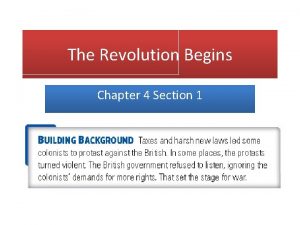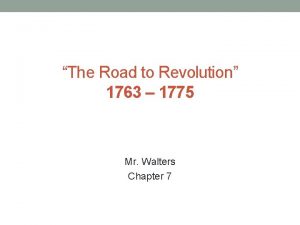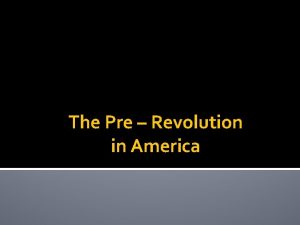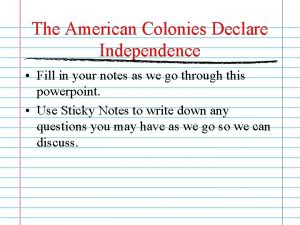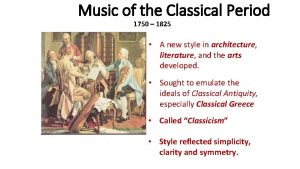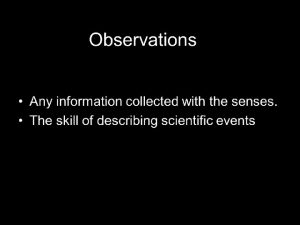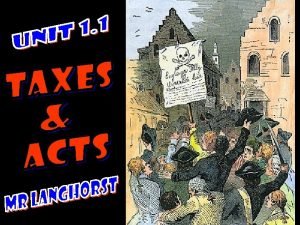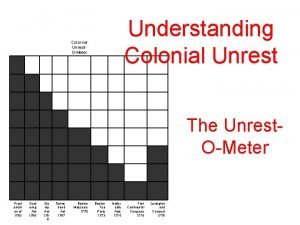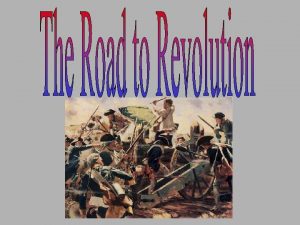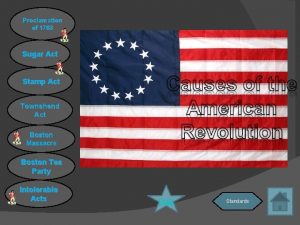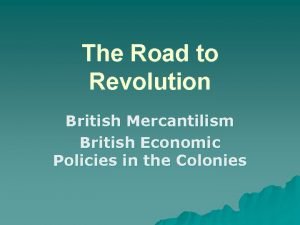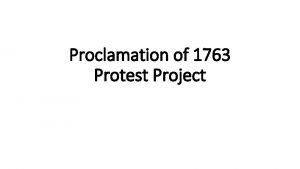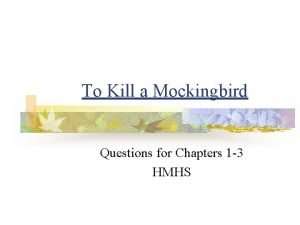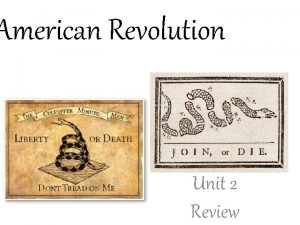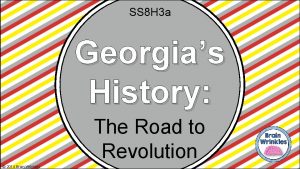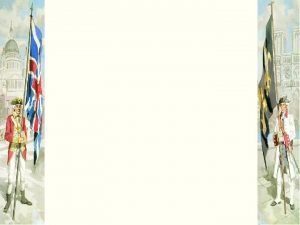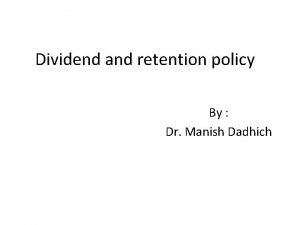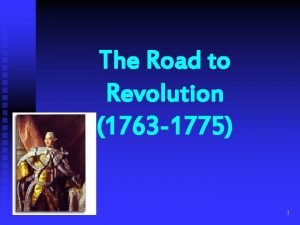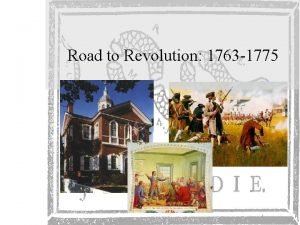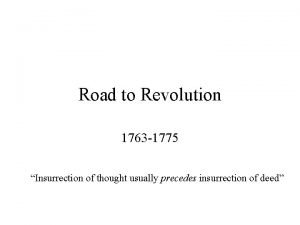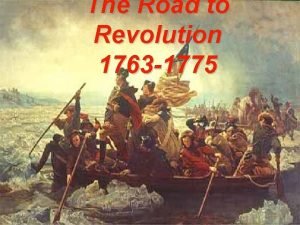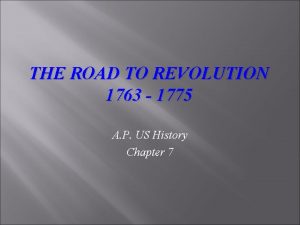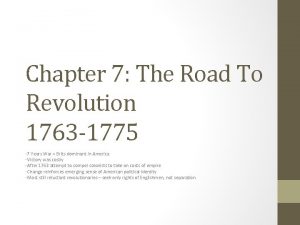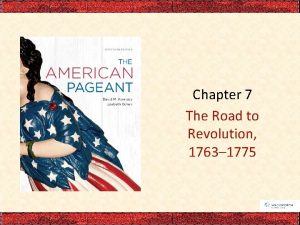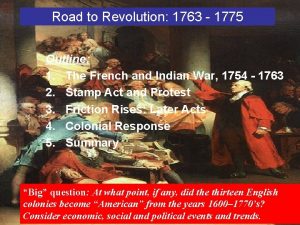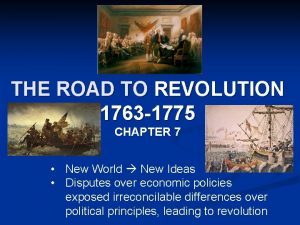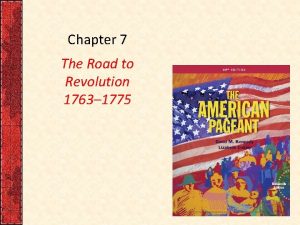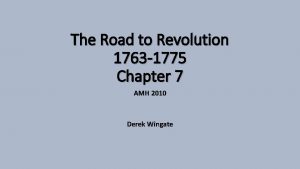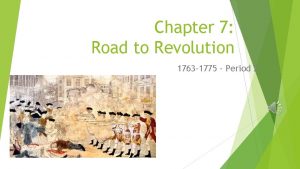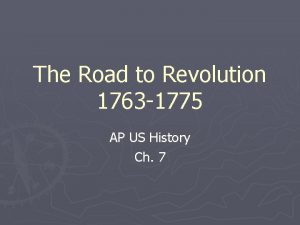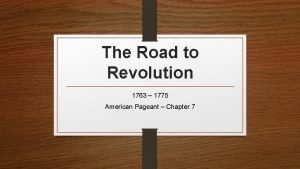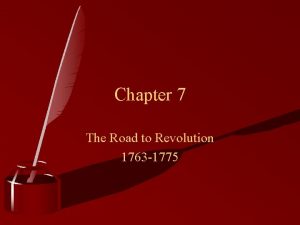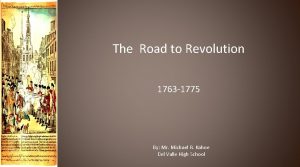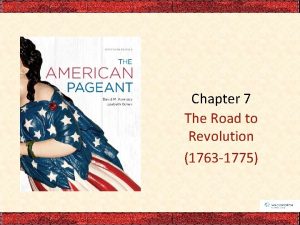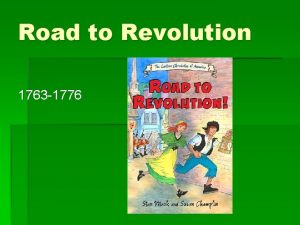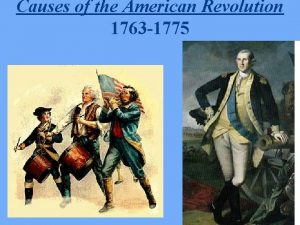The Road to Revolution 1763 1775 Mr Walters
























- Slides: 24

“The Road to Revolution” 1763 – 1775 Mr. Walters Chapter 7

I. The Deep Roots of Revolution In a broad sense, the American Revolution began when the first colonists set foot on America. 2. The F and I war may have lasted for eight years, but a sense of independence had already begun to develop because London was over 3000 miles away. 1. a. b. c. d. Sailing across the Atlantic in a ship often took 6 to 8 weeks. Survivors felt physically and spiritually separated from Europe. Colonists in America, without influence from superiors, felt that they were fundamentally different from England, and more independent. Many began to think of themselves as Americans.

II. 1. The Mercantile Theory Of the 13 original colonies, only Georgia was formally planted by the British government. a. The rest were started by companies, religious groups, land speculators, etc… 2. The British embrace a theory that justified their control of the colonies: mercantilism: a. b. c. A country’s economic wealth could be measured by the amount of gold or silver in its treasury. (Bullionism) To amass gold and silver, a country had to export more than it imported. For America, that meant giving Britain all the ships, ships’ stores, sailors, and trade that they needed and wanted.

III. Mercantilism Rules Trade 1. The Navigation Laws were the most famous of the laws to enforce mercantilism. a. b. c. The Navigation Laws restricted commerce from the colonies to England (and back) to only English ships, and none other. Other laws stated that European goods consigned to America had to land first in England, where custom duties could be collected. Also, some products could only be shipped to England not other nations.

IV. 1. The Merits of Mercantilism The Navigation Laws were hated, but until 1763, they were not really enforced much, resulting in widespread smuggling. a. Tobacco planters couldn’t ship it to anywhere except Britain. 2. Strangely, Americans had unusual opportunities for selfgovernment. 3. Britain didn't want to be bothered with the minor details. 4. Americans also had the mightiest army in the world, and didn’t have to pay for it. a. After independence, the U. S. had to pay for a tiny army and navy. 5. Basically, the Americans had it made: even repressive laws weren’t enforced much, and the average American benefited much more than the average Englishman.

V. The Menace of Mercantilism However, after Britain started to enforce mercantilism in 1763, the fuse for the American Revolution was lit. 2. Disadvantages: 1. a. b. c. d. Americans couldn’t buy, sell, ship, or manufacture under the most favorable conditions for them. The South, which produced crops that weren’t grown in England, was preferred over the North. Virginia, which grew just tobacco, were at the mercy of the British buyers, who often paid very low and were responsible for putting many planters into debt. Many colonists felt that Britain was just milking her colonies for all their worth

VI. 1. 2. After the Seven Years’ War, Britain had a HUGE debt, and though it fairly had no intention of making the Americans pay off all of it for Britain, it did feel that they should pay off onethird of the cost, since Redcoats had been used for the protection of the Americans. Prime Minister George Grenville, an honest and able financier ordered that the Navigation Laws be enforced, arousing resentment of settlers. a. 3. The Stamp Tax Uproar He also secured the “Sugar Act” of 1764 The Quartering Act of 1765 required certain colonies to provide food and quarters for British troops.

VI. The Stamp Tax Uproar (cont) 1. In 1765, he also imposed a stamp tax to raise money for the new military force. a. b. c. d. 2. The Stamp Act mandated the use of stamped paper of the affixing of stamps, certifying payment of tax. Stamps were required on bills of sale for about 50 trade items as well as on certain types of commercial and legal documents. Both the Stamp Act and the Sugar Act provided for offenders to be tried in the admiralty courts, where defenders were guilty until proven innocent. Grenville felt that these taxes were fair, as he was simply asking the colonists to pay their share of the deal; plus, Englishmen paid a much heavier stamp tax. Americans felt that they were unfairly taxed for an unnecessary army (hadn’t the French army and Pontiac’s warriors been defeated? ), and lashed back violently, especially against the stamp tax. a. “No taxation without representation!”

VI. The Stamp Tax Uproar (cont) 1. 2. 3. Americans denied the right of Parliament to tax Americans, since no Americans were seated in Parliament. Grenville replied that these statements were absurd, and pushed the idea of “virtual representation, ” in which every Parliament member represented ALL British subjects. Americans rejected “virtual representation, ” and in truth didn’t really want representation because that wouldn’t have done them good, and if they had really had representation, there wouldn’t be a principle for which to rebel.

VII. Parliament Forced to Repeal the Stamp Act 1. In 1765, representatives from nine colonies met in NYC to discuss the Stamp Tax. a. 2. 3. The Stamp Act Congress was largely ignored in Britain, but was a step toward intercolonial unity. Some colonists agreed to boycott supplies, instead, making their own and refusing to buy British goods. Sons and Daughters of Liberty took law into their own hands, tarring and feathering violators among people who had agreed to boycott the goods. a. b. c. They also stormed the houses of important officials and took their money. Stunned, demands appeared in Parliament for repeal of the stamp tax, though many wanted to know why 7. 5 million Brits had to pay heavy taxes to protect the colonies? In 1766, Parliament repealed the Stamp Act but passed the Declaratory Act, proclaiming that Parliament had the right “to bind” the colonies “in all cases whatsoever. ”


VIII. The Townshend Tea Tax and the Boston “Massacre” 1. “Drunk Charley” Charles Townshend persuaded Parliament to pass the Townshend Acts in 1767. a. They put light taxes on white lead, paper, paint, and tea. 1. 2. 3. In 1767, New York’s legislature was suspended for failure to comply with the Quartering Act. Tea became smuggled so to enforce the law, Brits had to send troops to America. On the evening of March 5, 1770, a crowd of about 60 townspeople in Boston were harassing some ten Redcoats. a. b. c. One got hit in the head, another got hit by a club. Without orders but heavily provoked, they opened fire, wounding or killing eleven “innocent” citizens, including Crispus Attucks, the “leader” of the mob. (Boston Massacre) Only two Redcoats were prosecuted. John Adams defended them.


IX. • The Seditious Committees of Correspondence The colonies, in order to spread propaganda and keep the rebellious moods, set up committees of correspondence; the first was started by Samuel Adams.

X. Tea Parties at Boston and Elsewhere In 1773, the powerful British East India Company, overburdened with 17 million pounds of unsold tea, was facing bankruptcy. 2. The British decided to sell it to the Americans, who were suspicious and felt that it was a shabby attempt to trick the Americans with the bait of cheaper tea and pay tax. 3. On December 16, 1773, some Whites disguised as Indians opened 342 chests and dumped the tea into the ocean. 1.

XI. 1. 2. Parliament Passes the “Intolerable Acts” In 1774, by huge majorities, Parliament passed a series of “repressive acts” to punish the colonies, namely Massachusetts. The Boston Port Act a. b. 3. 4. Boston Harbor was closed until retribution was paid. Also, enforcing officials who killed colonials could now be tried in England. Massachusetts Government Act a. The charter of Massachusetts was revoked. The Quebec Act a. b. It guaranteed Catholicism to the French-Canadians, permitted them to retain their old customs, and extended the old boundaries of Quebec all the way to the Ohio River. Americans saw their territory threatened and aroused anti-Catholics were shocked at the enlargement that would make a Catholic area as large as the original 13 colonies.

Quebec Before and After 1774

XII. The Continental Congress and Bloodshed A. The First Continental Congress 1. In Philadelphia, from September 5 th to October 26 th, 1774, the First Continental Congress met to discuss problems. 1. While not wanting independence then, it did come up with a list of grievances, which were ignored in Parliament. 2. Only Georgia didn’t have a representative there. 3. Also, they came up with a Declaration of Rights. 4. They agreed to meet again in 1775 (the next year) if nothing happened.

XII. The Continental Congress and Bloodshed (cont) A. The “Shot Heard ‘Round the World” 1. 2. In April 1775, the British commander in Boston sent a detachment of troops to nearby Lexington and Concord to seize supplies and to capture Sam Adams and John Hancock. Minutemen, after having eight of their own killed at Lexington, fought back at Concord, pushing the Redcoats back, sniping them from behind rocks and trees.

XIII. Imperial Strength and Weaknesses 1. 2. WAR!!! Britain had the heavy advantage: 7. 5 million people to America’s 2 million, superior naval power, great wealth. Some 30, 000 Hessians (German mercenaries) were also hired by George III, in addition to a professional army of about 50, 000 men, plus about 50, 000 American loyalists and many Native Americans.

XIV. American Pluses and Minuses A. Advantages 1. Americans had great leaders like George Washington (giant 2. 3. 4. 5. general), and Ben Franklin (smooth diplomat). They also had French aid (indirect), as the French provided the Americans with guns, supplies, gunpowder, etc… Marquis de Lafayette, at age 19, was made a major general in the colonial army. The colonials were fighting in a defensive way, and they were selfsustaining. They were better marksmen. B. A competent American rifleman could hit a man’s head at 200 yards. 1. The Americans enjoyed the moral advantage in fighting for a just cause.

XIV. American Pluses and Minuses (cont) A. Disadvantages 1. 2. Americans were terribly lacking in unity, though. Jealousy was prevalent, as colonies resented the Continental Congress’ attempt at exercising power. a. Sectional jealousy boiled up over the appointment of military leaders; some New Englanders almost preferred British officers to Americans from other colonies. 3. Inflation also hit families of soldiers hard, and made many people poor.

XV. A Thin Line of Heroes The American army was desperately in need of clothing, wool, wagons to ship food, and other supplies. 2. Many soldiers had also only received rudimentary training. 3. German Baron von Steuben, who spoke no English, whipped the soldiers into shape. 4. Blacks also fought and died in service, though in the beginning, many colonies barred them from service. 1. a. By war’s end, more than 5000 blacks had enlisted in the American armed forces.

XV. A Thin Line of Heroes (cont) 5. 6. African-Americans also served on the British side. In November 1775, Lord Dunmore, royal governor of Virginia, issued a proclamation declaring freedom for any enslaved black in Virginia who joined the British Army. a. By war’s end, at least 1400 Blacks were evacuated to Nova Scotia, Jamaica, and England. 7. 8. Many people also sold to the British because they paid in gold. Many people just didn’t care, and therefore, raising a large number of troops was difficult, if not impossible. 9. Only because a select few threw themselves into the cause with passion, did the Americans win. 10. Seldom have so few done so much for so many.
 May 1775
May 1775 Leghíresebb matematikusok
Leghíresebb matematikusok May 1775
May 1775 1775-mr4
1775-mr4 Peter zenger american revolution
Peter zenger american revolution Battle of lexington and concord winner
Battle of lexington and concord winner May 1775
May 1775 Classical music has less complicated texture
Classical music has less complicated texture Carl wilhelm scheele forensics
Carl wilhelm scheele forensics What is paved and unpaved road
What is paved and unpaved road Why did the colonists hate the proclamation of 1763
Why did the colonists hate the proclamation of 1763 Proclamation of 1763
Proclamation of 1763 Proclamation of 1763
Proclamation of 1763 Proclamation of 1763 picture
Proclamation of 1763 picture Navigation acts 1763
Navigation acts 1763 First nations attack fort michilimackinac
First nations attack fort michilimackinac Proclamation of 1763 protest
Proclamation of 1763 protest To kill a mockingbird quiz chapters 1 11
To kill a mockingbird quiz chapters 1 11 Quartering act definition
Quartering act definition Proclamation of 1763 caricatures
Proclamation of 1763 caricatures What did the proclamation of 1763 forbid
What did the proclamation of 1763 forbid North america map 1750
North america map 1750 According to walter, a firm should pay 100% dividend, if
According to walter, a firm should pay 100% dividend, if Bookish crickhowell
Bookish crickhowell Wave eric walters chapter summaries
Wave eric walters chapter summaries


